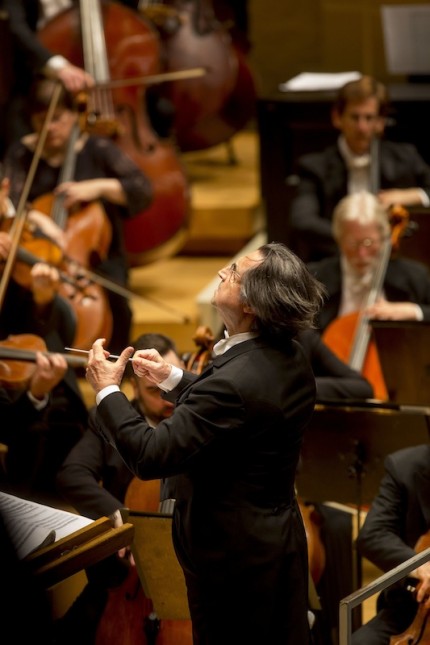Muti, CSO deliver power and poetry with Russian rarities

Riccardo Muti has returned to lead the final two weeks of the Chicago Symphony Orchestra season. Thursday night’s program continued the music director’s dueling Russian cycles of Scriabin and Tchaikovsky in this penultimate program.
For all the perfumed exoticism and iridescent hues of Scriabin’s early symphonies, performed here last winter, the First and Second feel undeniably overblown. One senses the composer inflating his allusive style to the dimensions and formal rigor of a genre he wasn’t entirely comfortable with.
Scriabin’s Le Poème de l’extase, on the other hand, stands with his piano sonatas among the composer’s most successful achievements. The Poème —his Fourth Symphony but really more of a tone poem—is cast in a single movement of just 20 minutes and the concision works to Scriabin’s advantage, forcing a tauter musical argument. If the composer’s typically overwrought program bewilders (“the Joy of Liberated Action. The Cosmos, Spirit is Eternal Creation without External Motivation, a Divine Play of Words”), the music is stunning. Scored for massive forces (nine horns, five trumpets, triple winds and organ), the Poème offers Scriabin’s trademark rhapsodic climaxes and sensual lyricism, alongside moments of great elegance and delicacy.
The Poem of Ecstasy made a fitting and effective conclusion to Muti’s season-long Scriabin survey. If Thursday’s performance was stronger on drama and power than mystery and languor (see Muti’s Philadelphia Orchestra recording for EMI), the performance was still thrilling and resplendent, polished to a fine sheen. Muti navigated the ebb and flow with firm yet supple architectural command, and even in the mounting climactic waves of the final pages, everything emerged with bracing clarity and transparency.
Christopher Martin’s glorious playing of the prominent trumpet part was stirring and, well, ecstatic, ably seconded by John Hagstrom and the rest of the enlarged brass section. Also contributing notably were concertmaster Robert Chen and guest flutist Stefán Ragnar Höskuldsson, principal of the Metropolitan Opera Orchestra.
If Le Poème de l’extase is Scriabin’s most performed symphonic work, the Manfred Symphony is that rarest of things, an underplayed work by Tchaikovsky. Muti made a superb Manfred recording with the Philharmonia in 1981 (EMI), which sparked some reevaluation, but even today Manfred is a concert hall curio, conductors warily poking it with a stick every couple decades.
Unlike his first three symphonies, Manfred is a work of Tchaikovsky’s maturity, written between the Fourth and Fifth. His only directly programmatic work in the genre, Manfred was inspired by Byron’s poem about the conflicted wandering title hero. It is the longest Tchaikovsky symphony at nearly an hour, and scored for the largest resources.
Despite its early success and Tchaikovsky’s initial satisfaction with Manfred, it’s hard not to agree with the composer’s later misgivings about the symphony, with the end result not quite hanging together and feeling like less than the sum of its parts.
Still, the best of those parts are very fine indeed. There is a tense, dogged quality to Manfred’s main theme, which opens the work and recurs in each of the four movements. The craggy grimness of the outer movements is leavened by moments of radiant lyricism as with the waterfall vision of the fairy Astarte in the second movement and the rustic pastorale of the third.
Thursday night, Muti led a boldly projected performance, taking a tougher, harder-edged approach to this epic canvas. The conductor clearly believes in this score and Muti drew out the score’s brooding drama with fire and conviction, eliciting playing of comparable power and dedication from the orchestra.
Yet there was also effective contrast as with the beguiling tenderness of the Astarte theme and the lilting grace of the bucolic third movement. Muti drew playing of gossamer lightness from the harp and violins in the second movement’s magical coda. Characteristically, Muti opted for Tchaikovsky’s original, somewhat problematic ending, yet the drive, intensity and polished fire of the playing made the fugue and organ apotheosis work convincingly.
The Manfred performance offered one of the CSO’s finest achievements all season, collectively and individually. The musicians gave their music director everything he asked for with playing that was responsive and beautifully refined, yet they also unleashed the requisite dramatic punch with daunting force. While the playing was outstanding across all sections, there were especially fine contributions from clarinetist Stephen Williamson, bass clarinet John Bruce Yeh, and the CSO’s new principal bassoon Keith Buncke.
The program will be repeated 8 p.m. Friday and Saturday. cso.org; 312-294-3000.
Posted in Performances





Posted Jun 12, 2015 at 4:56 pm by Daniel Cohn
Although the performance of the first work on the program, the Scriabin, had excellent solo playing as noted above and was solid, I felt that the final outburst of the main theme toward the end could have been even more overwhelmingly powerful. After all, it is about ecstasy. It seemed that way to me when I once head it performed with the Civic Orchestra under another conductor, although that ending might have been a bit overblown.
But the complete power of music and of the CSO was reserved for the Manfred Symphony. I agree completely with Mr. Johnson’s assessment of the performance: not just outstanding, but unbelievable. I was not too familiar with the entire work and was greatly moved by the beauty of the playing and rural, pastoral mood in the third movement. There were some great performances this season by the CSO, but the precision and esthetic and dramatic impact of this performance of this seldom-played work really stood out as being exceptional. Muti was given a more enthusiastic response than I have noticed with any other conductor this season.